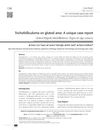39 citations,
October 2012 in “Familial cancer” New therapies for Birt–Hogg–Dubé syndrome are being developed based on understanding the FLCN gene's role.
 September 2022 in “Women's healthcare”
September 2022 in “Women's healthcare” PCOS is managed by lifestyle changes and personalized medication to improve symptoms and fertility.
4 citations,
December 1994 in “PubMed” A woman’s skin bumps healed almost completely with tretinoin cream after a leg infection.
A young girl had a rare neck cyst removed and needs careful monitoring for related health issues.
12 citations,
March 2013 in “The American journal of dermatopathology/American journal of dermatopathology” Birt–Hogg–Dubé Syndrome requires genetic testing for accurate diagnosis due to its similarities with tuberous sclerosis.
28 citations,
January 1986 in “International Journal of Dermatology” A pregnant woman developed a rash caused by a yeast infection, not acne.
 1 citations,
February 2017 in “Journal of gynecology and womens health”
1 citations,
February 2017 in “Journal of gynecology and womens health” The document concluded that more research is needed to understand how estrogen affects the enzyme involved in hirsutism development.
 January 2024 in “ACTA SCIENTIAE VETERINARIAE”
January 2024 in “ACTA SCIENTIAE VETERINARIAE” An epidermoid cyst in a dog's mammary gland is rare and benign.
35 citations,
September 2006 in “American Journal Of Pathology” Odontogenic keratocysts are caused by abnormal Hedgehog signaling and can lead to tooth and bone issues.
8 citations,
March 2010 in “Chinese medical journal/Chinese Medical Journal” Malassezia infection may cause refractory acne, and antifungal treatments can help.
89 citations,
March 2001 in “Endocrine practice” The guidelines help doctors diagnose and treat hormone-related disorders in women.
107 citations,
March 2014 in “BoneKEy Reports” Mutations in the vitamin D receptor cause hereditary vitamin D-resistant rickets, leading to poor bone health and requiring high calcium doses for treatment.
53 citations,
January 2013 in “Journal of toxicologic pathology” The project created a standardized system for classifying skin lesions in lab rats and mice.
50 citations,
December 2005 in “European Journal of Immunology” RXRα is crucial for proper immune response and links diet to immune function.
2 citations,
January 2023 in “Frontiers in Veterinary Science” Buffalo flies and Stephanofilaria nematodes cause severe skin lesions in beef cattle, and treatment should target both.
 August 2024 in “Current Protocols”
August 2024 in “Current Protocols” The C3H/HeJ mouse model is useful for studying and testing treatments for alopecia areata.
 January 2024 in “JCEM case reports”
January 2024 in “JCEM case reports” This is the first known case of parathyroid cancer in a patient with Birt Hogg Dube Syndrome.
 5 citations,
January 2011 in “Journal of the Korean Association of Oral and Maxillofacial Surgeons”
5 citations,
January 2011 in “Journal of the Korean Association of Oral and Maxillofacial Surgeons” A woman developed a cyst in her parotid gland after a botox injection, which was successfully removed with surgery.
 4 citations,
April 2016 in “Journal of Dermatology Research and Therapy”
4 citations,
April 2016 in “Journal of Dermatology Research and Therapy” Anti-androgens are safe and effective for treating moderate to severe adult female acne.

Benign skin tumors need accurate diagnosis to ensure proper treatment.
 June 2023 in “Benha Journal of Applied Sciences”
June 2023 in “Benha Journal of Applied Sciences” Acne is caused by multiple types of bacteria.
 68 citations,
September 2003 in “British Journal of Dermatology”
68 citations,
September 2003 in “British Journal of Dermatology” Shrinking skin cancer increases the chance of cancer in nearby lymph nodes.
 15 citations,
September 2007 in “Cell & tissue research/Cell and tissue research”
15 citations,
September 2007 in “Cell & tissue research/Cell and tissue research” Embryonic and adult stem cells are valuable for improving skin grafts and cell therapy.
 February 2024 in “Journal of medical science and clinical research”
February 2024 in “Journal of medical science and clinical research” Radiotherapy effectively treated a large scalp tumor in an elderly woman, avoiding surgery.
 September 2022 in “TURKDERM”
September 2022 in “TURKDERM” A rare benign skin nodule was found on the buttock, a unique location for this condition.
 November 2017 in “International journal of research in dermatology”
November 2017 in “International journal of research in dermatology” A rare skin disorder, nevus comedonicus, can appear on one side of the body following Blaschko's lines.
 81 citations,
November 2012 in “Journal of the National Cancer Institute”
81 citations,
November 2012 in “Journal of the National Cancer Institute” The tumor suppressor gene FLCN affects mitochondrial function and energy use in cells.
 11 citations,
July 2003 in “The Nurse practitioner”
11 citations,
July 2003 in “The Nurse practitioner” New treatments for PCOS focus on managing symptoms and improving fertility.
 January 2018 in “Springer eBooks”
January 2018 in “Springer eBooks” The document says that early treatment of Acne Vulgaris is important to prevent scarring and that adult onset acne is common in women, often due to hormonal imbalances.
 197 citations,
June 2009 in “American journal of human genetics”
197 citations,
June 2009 in “American journal of human genetics” WNT10A mutations often cause ectodermal dysplasias, with males showing more tooth issues than females.

















